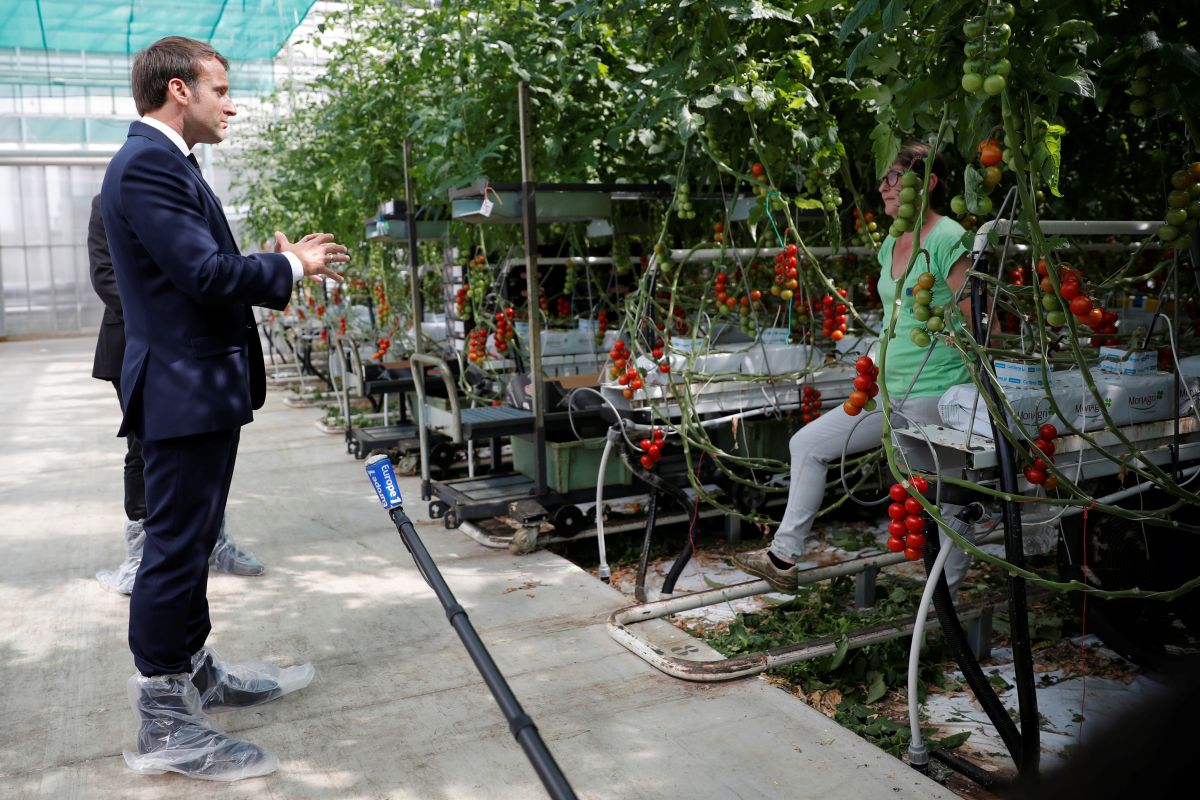The Strategic Dimension of French Agricultural Policy
The economic crisis caused by the pandemic and Russia’s invasion of Ukraine have highlighted that agricultural policy is about ensuring both trade gains as well as sovereignty and food security. The strategic nature of agriculture and the agri-food industry, and the need for protectionist measures, are increasingly emphasised in the French public debate. The challenge for France will be to ensure food sovereignty while continuing the sector’s green transformation.
 STEPHANE MAHE/Reuters/Forum
STEPHANE MAHE/Reuters/Forum
France is the largest agricultural producer in the EU (about 18% of production) and the top beneficiary of the Common Agricultural Policy (CAP). France’s agricultural production in 2021 reached €82.3 billion in basic prices, an increase of 7.5% compared to 2020 and more than 3% of GDP. According to the Ministry of Agriculture and Food, in 2021 the surplus in trade in agri-food products will amount to almost €8.2 billion—€2 billion more than in 2020 and the third surplus in trade in goods after the aviation and chemical industry. France produces mostly cereals, wine, beef, poultry, dairy products, oilseeds, and potatoes. In 2019, the agricultural sector and the agri-food industry created about 1.5 million jobs in France, which is about 5% of employment.
Challenges
Despite the industry’s resilience to external shocks, France has experienced a decline in the competitiveness of agri-food products on the EU market. The loss of about 30% of its market share in less than 20 years is also due to differences in the standards regulating domestic production and those imposed on imports from outside the EU. About 20% of food is imported, mainly from EU countries. France lost a third of its food trade surplus within a decade. It is based mainly on the export of wines and spirits (98% of cognac production is exported) and the export of dairy products, seeds, and cereals, mainly to North Africa and the Middle East. Without wines, spirits, and cereals, France would be a net importer of agri-food products.
The domestic market depends on the import of strategic goods from outside the EU such as plant-based protein—livestock feed basis (peas, rapeseed, soybean, sunflower) and important food products (lentils, chickpeas). Its role in international competition was underlined by the trade war between the U.S. and China. Plant-based protein production volumes in the EU do not match the demand for high-protein feed, resulting in heavy dependence on imports (mainly from the U.S., Brazil, and Argentina) and highlighting the structural weaknesses of European agriculture. The EU imports around 17 million tonnes of crude plant-based protein annually, including around 13 million tonnes of soybeans, making it the second-largest importer in the world after China. In France, nearly 90% of protein imports are intended for feed, which threatens the competitiveness of breeding on the world market, as feed inputs may account for more than half of the cost of livestock production. Moreover, the import of sunflower seeds from the Black Sea region (Ukraine, Russia) increased. The remedy may be to reduce these products in fodder doses and to develop domestic production of rapeseed and sunflower seeds.
Many branches of agriculture and the agri-food industry are losing profitability. This affects farmers’ living standards and exacerbates demographic problems in the countryside. Almost 90% of income in French agriculture comes from direct payments (the EU average is 63%). It is estimated that farmers work an average of 55 hours a week (the statutory working time is 35 hours). The percentage of employed farmers is gradually decreasing, and the average age in agriculture is 52 years. France could lose a quarter of its farmers in the next 10 years.
The ecological challenge is the tendency to concentrate farms (on average, one farm in France covers an average of 63 hectares), decarbonisation, and the development of low-carbon agriculture. The agricultural sector is responsible for 19% of emissions, the third-highest sector (after transport and industry) of greenhouse gas emissions. The National Low Emission Strategy (Stratégie Nationale Bas-Carbone) adopted by France aims to reduce greenhouse gas emissions in agriculture by 45% by 2050.
External Instruments
CAP reform was the subject of difficult negotiations during the German and Portuguese presidencies of the Council of the EU. France, under pressure from domestic agricultural organisations, sought to stabilise the budget, simplify the mechanisms of direct payments to farmers, and maintain the role of these payments as an essential element of the CAP, as well as provide farmers with a decent income and increase market competitiveness. The new regulations for 2023–2027 will enter into force on 1 January 2023. In line with France’s intentions, CAP provides support for the transformation of agricultural areas to increase competitiveness while protecting the environment. The priorities of the French Strategic Plan for the CAP correspond to the strategic challenges. They assume the development of leguminous plant production and doubling the area of organic farming by 2027. They provide for the diversification of crops, strengthening the agroecosystem’s ability to respond to climate change and synergy of cultivation and animal breeding.
France strengthened cooperation with Spain to promote so-called “mirror clauses” in EC negotiations on trade agreements with third countries to impose on them the same requirements and production standards, and thus protect the internal market. In the negotiations of the EU trade agreement with Mercosur, President Emmanuel Macron referred to the need to protect the climate, while securing the interests of domestic agriculture. The French presidency of the Council of the EU will also seek to limit the use of pesticides as part of the EC’s “Farm to Fork” strategy and the revision of the relevant directive. In the face of Russia’s aggression against Ukraine, French farmers are calling for an increase in domestic grain production to meet the demand from other European and North African countries dependent on imports from Russia and Ukraine. France—the world’s third-largest grain exporter—does not want to lose its market share to the U.S. and Canada.
Agriculture in the Presidential Campaign
Agricultural policy plays an important role in the candidates’ electoral programmes. Macron emphasises the need to strengthen food sovereignty, reform farmers’ wages, increase investment in sector innovation (agrorobotics, biotechnology) and carry out a generational change in the countryside. Valérie Pécresse puts food sovereignty at the centre and proposes loosening food production standards that are much stricter than European standards. Marine Le Pen announced she would pursue a revision of free trade agreements to increase the competitiveness of high-quality French products and the introduction of a requirement to supply canteens with 80% domestic products. Like Éric Zemmour, Le Pen wants to ban the import of food products that do not meet French standards. Zemmour also offers €10,000 subsidies for each child born in a rural commune. Left-wing candidate Jean-Luc Mélenchon advocates introducing minimum prices for agri-food products, raising the minimum wage to increase demand for these products, introducing food stamps of €150 for the poorest and increasing leguminous plant production for food purposes.
Conclusions and Perspectives
Farmers are an important electorate in the ongoing presidential campaign. Research shows this is a highly mobilised electorate that may have an impact on the election results. Their political views are close to the centre-right (about 45% of voters). The extreme right is supported by around 15% of these voters. Acquiring a rural electorate will be a big challenge for Macron, whose actions in this area are not well assessed. Three out of four farmers are rather pessimistic about the future of French agriculture.
The pursuit of food sovereignty can hamper trade with the Americas. The wheat trade will be particularly important in the coming years and may increase France’s competitiveness by increasing production and using the country’s surplus wheat for export. The drop in supply from Russia and Ukraine creates an opportunity to regain the market in Algeria, which has reduced imports from France in favour of Russia. The war in Ukraine also raises gas prices, which will increase the costs of producing fertilisers in France and, consequently, food products such as flour and bread.
Both Poland and France benefit from the increasing competitiveness on the agricultural market, establishing a permanent crisis reserve in the event of unstable agricultural prices or markets, and accelerating the modernisation of agriculture to reduce its harm on the climate and improve energy efficiency. In shaping the CAP for Poland, unlike France, it will be important to maintain broad support for small and medium-sized farms.


